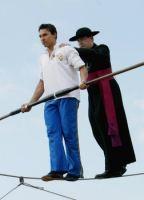Pope Benedict announced last week that he is willing to accept disaffected Anglicans into the Catholic Church as a body. What is more, he will make conversion easier for them. The Pontiff’s approval of the “Apostolic Constitution” document will allow Anglicans who join the Roman Catholic Church to retain some of their liturgical traditions. Under the provisions of the document unmarried former Anglican priests could be appointed as leaders or bishops to look after communities of newly converted Catholics who recognise the Pope as their leader.
Traditionalist Anglicans have been upset for years over innovations such as women priests. Then there was the ordination of homosexual bishops to contend with and, most recently, the Church of England’s General Synod voted to consecrate women bishops. It was after this vote that some traditionalist bishops held secret talks in Rome to discuss how to proceed and whether Rome would recognise Anglo-Catholics in any way.
Some interesting questions are raised by the prospect of a large-scale defection to Rome: if married former Anglican priests are allowed to retain their ordained status - for the Roman Catholic Church can hardly ask them to divorce - could this in time change the Roman Catholic celibacy requirement? And what of the Anglicans who remain? Will they become even more progressive without the restraining influence of the traditionalists, thus causing the Church of England to lose what ability it has to appeal to a wide range of people?
Members of the traditionalist Forward in Faith group are openly considering conversion whilst some leading Anglicans have criticised the Vatican for not informing the Archbishop of Canterbury about its plans earlier. But how many businessmen inform their closest competitor of their new business plan? Surely the Vatican has spotted the gap in the market and one can hardly blame the Holy See for trying to fill it - “fishers of men” in every sense.









